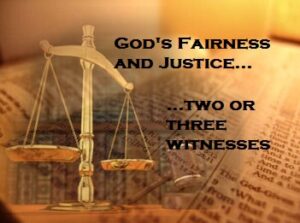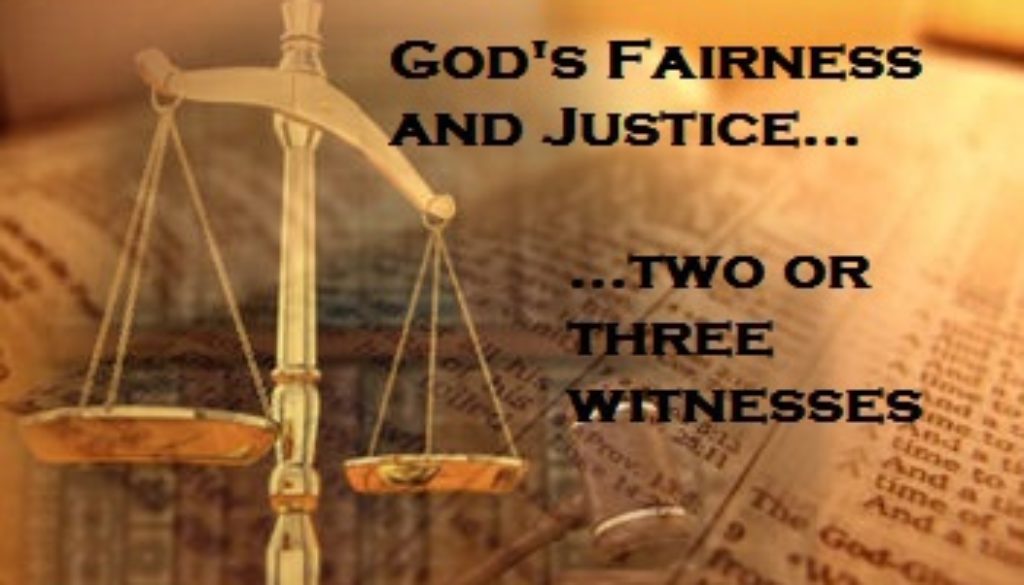Deuteronomy 19:15-21 Two Witnesses

Moses shares God’s standard for convicting a person of a crime. There must be at least two witnesses to the offense before someone can be convicted.
I like reading mysteries. I was thinking about the fact that in these stories there is more often than not no eye witnesses. In many crimes in real life there are no witnesses. It got me to thinking about how this would apply to today’s issues and how it could have dealt with the crimes without witnesses in the bible days. I’m going to skip over this for a few minutes and focus instead on the last part of our reading; malicious witnesses.
False or malicious witnesses bring to mind the “witnesses” at Jesus’ trial. I would call them paid witnesses. They were brought by the high priest and those who were helping to railroad Jesus. If they had to follow the stipulations of God’s laws here, once found to be false they would have to suffer the fate they sought to bring for Jesus. We are told that those charging Him couldn’t get them to agree on anything except that He said He would destroy the temple and raise it again in three days. That statement as they reported it was NOT worthy of the charges brought against Him.
God is not saying here in His law that someone who was mistaken should be punished but someone who deliberately tries to get another in trouble. This would apply no matter what the motivation behind their attempts. And the punishment for knowingly and maliciously giving false testimony is the same fate the accused would receive if convicted.
When we looked at the legal aspects of Jesus’ trial I went into detail about the requirements for witnesses. I’m going to place a link to that entry so you can go back and check it out if you want. Bottom line is, they had to be eye witnesses to the account, they had to agree on both minor and major points, and their stories couldn’t be carbon copies of one another.
In any event that is witnessed there are always variations in interpretation and perception. No two people look at anything in exactly the same way. It might be a difference of what their attention was focused on or a personal bias that colored their interpretation. So for two independent witnesses to agree is a fairly significant event. This is probably why God set this as His standard.
Let’s get back to my original question of how to handle crimes without eye witnesses. In early Jewish law the person confessing to the crime wasn’t admissible proof. They believed the person would have to be crazy, coerced, or depressed to confess to a crime, even one they did commit. So what evidence would be acceptable in such a situation?
I would submit that physical evidence would have to be gathered that conclusively pointed to the person being accused. This is the practice of law enforcement today. We look for “witnesses” in the form of physical evidence. Did God allow it to be so in Moses’ time? Would a distinct “shoe print” or garment piece be accepted as “witness” to a person’s guilt? He might have if you consider the story of Tamar’s pregnancy by Judah. She had physical evidence but no eye witnesses to this event. But was this kind of evidence acceptable in criminal cases?
Then we come to the problem of circumstantial evidence. Perception plays a big part in assigning guilt when there is no eye witness. Does the one presenting the evidence have enough persuasiveness to bring those charged with rendering the verdict to the same conclusion they themselves came to? Which party tells the better story? Or who is the more convincing liar?
I think this is where we have to step in and ask God to speak to the hearts of those in authority to let the truth be known. This was the design God had intended. His plan was based on the judges following Him in their hearts and rendering decisions based on careful examination of all parties involved, including Him. Moses modeled this when the people brought some who were breaking the Sabbath to him. He didn’t render judgment until AFTER consulting with God. He had plenty of witnesses but he needed God’s input on the appropriate sentence.
I believe the FULL recipe for justice is:
- Ask God to help you hear the truth and to guard your heart
- Listen carefully to both sides of the story
- Ask questions to elicit information
- Seek God’s guidance before rendering judgment if judgment must be made
Thank You Father for protecting me in the different situations where I had to deal with judges. Thank You for also giving me a heart that wants to hear ALL sides of the story before making any judgments. Please help me to hear the truth in what is said and to weed out the lies. Keep me OUT of conflicts to please Father! But when I am required to engage in them guide my every step and thought.



